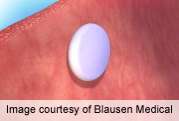(HealthDay)—Daily aspirin use, even at low doses, may reduce mortality among men with high-risk nonmetastatic prostate cancer, according to research published online Oct. 20 in the Journal of Clinical Oncology.
Eric J. Jacobs, Ph.D., of the American Cancer Society in Atlanta, and colleagues analyzed data for men diagnosed with nonmetastatic prostate cancer to assess the association between daily aspirin use and prostate cancer-specific mortality (PCSM). The men were enrolled in the Cancer Prevention Study-II Nutrition Cohort between 1992 or 1993 and June 2009, and followed up through 2010.
The researchers found that, after multivariable adjustment, neither prediagnosis (hazard ratio [HR], 0.92; 95 percent confidence interval [CI], 0.72 to 1.17) nor postdiagnosis (HR, 0.98; 95 percent CI, 0.74 to 1.29) daily use of aspirin showed a statistically significant association with PCSM compared with no aspirin use. Among men diagnosed with high-risk cancers (≥T3 and/or Gleason score ≥8), postdiagnosis daily aspirin use was associated with lower PCSM (HR, 0.60; 95 percent CI, 0.37 to 0.97). In this subgroup, no difference in mortality risk was observed according to aspirin dose, such as the typical low dose of 81 mg per day (HR, 0.50; 95 percent CI, 0.27 to 0.92) or higher doses (HR, 0.73; 95 percent CI, 0.40 to 1.34).
"A randomized trial of aspirin among men diagnosed with nonmetastatic prostate cancer was recently funded," the authors write. "Our results suggest any additional randomized trials addressing this question should prioritize enrolling men with high-risk cancers and need not use high doses."
One author disclosed financial ties to Bayer.
More information:
Abstract
Full Text (subscription or payment may be required)
Journal information: Journal of Clinical Oncology
Copyright © 2014 HealthDay. All rights reserved.




















